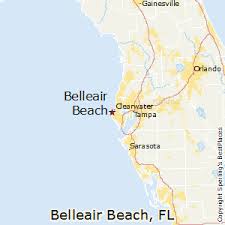By Susan Glickman, Southern Alliance for Clean Energy
Climate change is already costing Florida cities, large and small, a fortune. Officials desperately need to explore new avenues both to pay for efforts to make us more resilient and to dramatically reduce dangerous carbon pollution so we don’t make it worse. However, the looming question is: will taxpayers be left with the bill?
Look no further than my own small community of Belleair Beach on the west coast of Florida about 30 miles west of the Tampa International Airport where I have lived for almost 30 years. Though Belleair Beach’s current annual budget is only $2.7 million, flooding and heavy rains – both climate impacts – have forced my small city to spend $4 million on new stormwater projects, dipping into limited reserves and creating a “huge budget gap,” according to Mayor Gary Katica.
Now Belleair Beach officials are proposing a new stormwater fee for residents. This is the latest example of how flooding, made more severe and frequent thanks to climate change, is increasing costs for taxpayers.

Across the state, communities are facing even higher costs. In the Miami area, combatting storm surge means $4.6 billion for sea walls as high as 15 feet, and that’s just for one project.
Impacts from climate change will continue driving these costs higher and higher. But it’s key that officials acknowledge that everyday Floridians are not to blame for the warming climate and rising seas.
The fossil fuel industry – and in particular a small number of major oil and gas companies such as Exxon, Chevron, BP and Shell — are responsible for the majority of greenhouse gas emissions that are causing climate change. Like tobacco companies and opioid manufacturers, fossil fuel executives spent decades misleading the public about the harm their products caused while communities like ours in Florida pay the price.
In recent years, a growing number of state, county, and city governments have gone to court to hold the oil industry accountable for its deception and make them pay for the billions of dollars in damage they caused. From Rhode Island to Colorado to Hawaii, these communities point to the growing body of evidence that oil companies spent decades lying to the public about what they knew to be true: their products posed a “potentially catastrophic” threat to the climate.
Instead of reshaping their business or warning the public, the industry took steps to protect their own assets and infrastructure from rising seas and other climate damages, while leaving the rest of us to fend for ourselves.

According to the peer-reviewed work of Harvard researchers Naomi Oreskes and Geoffrey Supran, the oil industry’s goal was straightforward: confuse the public about climate change, downplay its risk, and sow doubt about the science in order to delay action and protect their profits. We are now seeing the damage that has resulted from their deceit.
Just last week, the attorney generals of Minnesota and the District of Columbia filed back-to-back consumer protection lawsuits. Minnesota filed against Exxon, Koch Industries, Minnesota’s largest oil refiner and the American Petroleum Institute.
D.C. targeted Exxon, BP, Chevron, and Shell. Both suits aim to hold them accountable for defrauding the public, withholding information, and wreaking havoc on local residents, economies, and ecosystems.
Like lawsuits filed against the tobacco and pharmaceutical industries, the case seeks to hold corporations responsible for lying about the damages they knew their products would cause. Among other remedies, the lawsuits seek financial restitution for the people of Minnesota and D.C.
Florida officials seeking alternative ways to fund climate mitigation projects should consider similar actions to ensure that the very polluters that caused this problem, and not taxpayers alone, pay their fair share of the damage.
Susan Glickman is the Florida Director of Southern Alliance for Clean Energy www.cleanenergy.org
“The Invading Sea” is the opinion arm of the Florida Climate Reporting Network, a collaborative of news organizations across the state focusing on the threats posed by the warming climate.



